Terachess
Bigger than bigger ! This is a Chess variant with 26 different pieces on a 16 x 16 board, an unrealistic summit.
There are 256 squares and 64 pieces per side which gives the same density than for Orthodox Chess.
In Terachess one will find again 26 kinds of men encountered in Shako , Tamerlane 2000, Metamachy. Zanzibar, Teramachy and Gigachess.
The first Terachess has been designed in 2008 and found a certain success:
- It has been included in the second version of Jocly, which is now no more supported, but it remains possible to play it on this link (Thanks to Ed Trice).
- A full set has been manufactured by Khoa Pham in Vietnam who untitled it Fairy Chess, the Mother of all Battles.
- Its openings have been studied in Japan, within a detailed blog linked here.
- In 2013, the rule for promotion of short-range pieces had been implemented.
If you come here for this 2008/2013 version, you will find it at the bottom of this page.
In 2020, Terachess has evolved to Terachess II in order to be consistent with my other chess variants. Several changes have been made. The Ship and the Corporal are no more used. On the opposite all compound pieces that can be made by combining the moves of Rook, Bishop, Knight and King are now present. Except the King and the Amazon, all not-Pawn pieces are present as pairs.
Terachess II is the most complex stage of a series:
-
11 x 11 board: Wild Tamerlane, Tamerlane 2000
-
16 x 12 board: Teramachy
-
14 x 14 board: Gigachess,
-
16 x 16 board: Terachess
The board is a 16 x 16 checkered squares with a white one at the right end of each player.
There are 64 pieces per side.
Set-up
The pieces are:
- 2 Sorceress, 2 Duchess, 2 Buffalos, 2 Cardinals, 2 Marshals, 2 Missionaries, 2 Centaurs, and 2 Admirals on 1st row
- 1 King, 1 Amazon, 2 Lions, 2 Crocodiles, 2 Rhinoceros, 2 Trolls, 2 Giraffes, 2 Camels, and 2 Cannons on 2nd row
- 2 Queens, 2 Eagles, 2 Princes, 2 Machines, 2 Bishops, 2 Knights, 2 Rooks, and 2 Elephants on 3rd row,
- 16 Pawns on 4th row.
The white King is placed on the center of the second row on a black square, the black King being on a white square. The Amazon lays beside the King. The other pieces are arranged as on the diagram below.
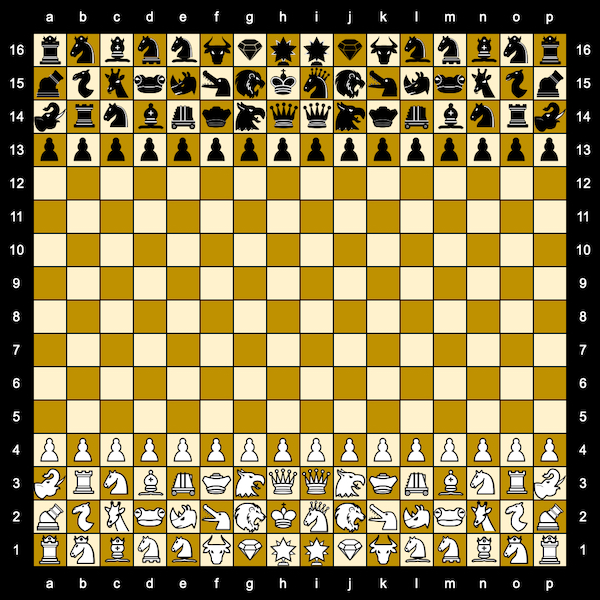
Terachess-II
Moves And Captures
- King: as in Metamachy, i.e. moves as in usual Chess with no castling but initial King's jump.
- Queen: she moves exactly as in usual Chess.
- Bishop: he moves exactly as in usual Chess.
- Knight: he moves exactly as in usual Chess and is promoted to a Buffalo on the last row.
- Rook: it moves exactly as in usual Chess, except there is no castling at Terachess.
-
Pawn: it moves as in Metamachy, not as is usual Chess. It can move straight forward one or two square from any position on the board, without capturing. It captures one square diagonally forward. When it reaches the last row it promotes to a Queen, and nothing else.
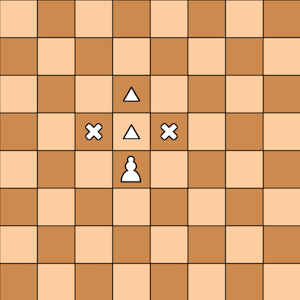
-
Prince: as in Metamachy. He moves and captures one square in any direction like a King, but without being hindered by check. Like the Pawn, he can also move without capturing to the second square straight ahead from any position on the board. When he reaches the last row it promotes to an Amazon, and nothing else.
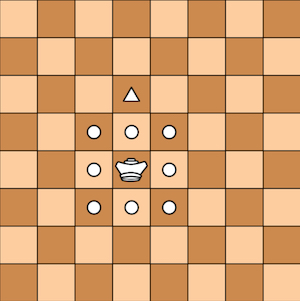
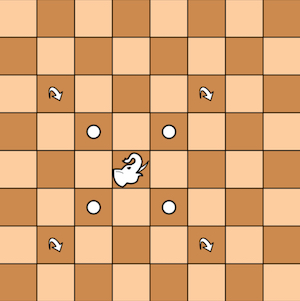
-
Machine: as in Zanzibar. It as it moves one or two squares on the rows or the columns. When an Elephant moves two squares, no matter what intermediate squares contain. When it reaches the last row it promotes to a Lion.

-
Camel: as in Metamachy. It jumps to the opposite square of a 2x4 rectangle, like an extended Knight. No matter what intermediate squares contain. It is also described as a (3,1) leaper. Note that it always stays on the same color of square. When it reaches the last row it promotes to a Buffalo.
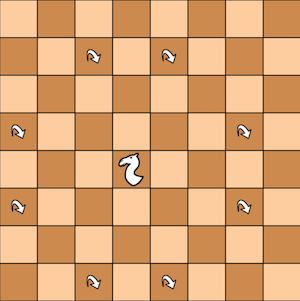
-
Giraffe: as in Zanzibar. It jumps to the opposite square of a 3x4 rectangle, like an extended Knight. No matter what intermediate squares contain. It is also described as a (3,2) leaper. Note that it always changes the same color of its square. Under the name of Zebra, it is also a fairy piece used by problemists for compositions. When it reaches the last row it promotes to a Buffalo.

-
Cannon: exactly as in in Xiangqi. Also in Shako and Metamachy. It moves without taking like a Rook, but it takes by going in a straight horizontal and vertical line and jumping over exactly one piece. When a Cannon takes a piece, there must be exactly one piece between the original and final square of the Cannon's move - this piece may be of either color.
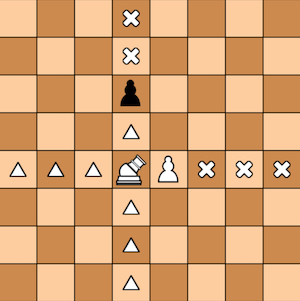
-
Lion: exactly as in Metamachy. It moves as a King (a single step move in any direction), or may jump to a position two squares away, jumping in any orthogonal or diagonal direction, or jumping as a Knight.
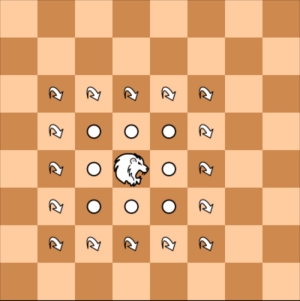
-
Eagle: exactly as in Metamachy. It moves one square diagonally and then, slides away of an indefinite number of squares vertically or horizontally. It is authorized to go only one square diagonal. It can not jump and the unobstructed path must start with the diagonal movement.
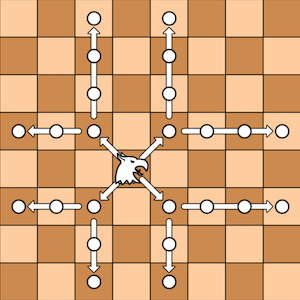
-
Rhinoceros: as in Zanzibar. It moves one square vertically or horizontally and then, slides away of an indefinite number of squares diagonally. It is authorized to go only one square in line or column. It can not jump and the unobstructed path must start with the orthogonal movement. It is a counterpart of the Eagle.

-
Buffalo: as in Zanzibar. It combines the leaps of the Knight (2,1 leaper), the Camel (3,1 leaper) and the Giraffe (3,2 leaper).
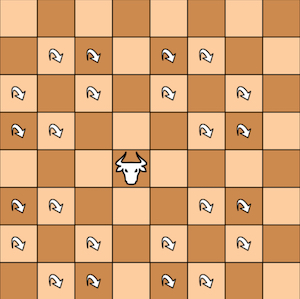
-
Crocodile: as in Zanzibar. It is the diagonal counterpart of the Chinese Cannon. It moves like a Bishop and needs an intermediate piece between itself and its victim to capture it. The Crocodile jumps the intermediate and takes the victim on its square. The intermediate is left unaffected. Also known as Vao by problemists.

-
Marshal: it combines the move of Rook and Knight. As in Gigachess.

-
Cardinal: it combines the move of Bishop and Knight. As in Gigachess.

-
Amazon: it combines the move of Queen and Knight. An old idea, used by Russians instead of the Queen in the 18th century. As in Gigachess.

-
Centaur: it is another compound piece that moves as a Knight or a non-royal King. Being a short-range piece, it promotes to a Lion when it reaches the last row. As in Gigachess.



-
Sorceress: it moves like a Queen and needs an intermediate piece between itself and its victim to capture it. The Sorceress jumps the intermediate and takes the victim on its square. The intermediate is left unaffected. Like the Queen is Bishop + Rook, the Sorceress is Cannon + Crocodile. As in Zanzibar.

-
Duchess: it moves as a limited Queen, one, two or three squares in any straight directions. When moving two or three squares, it may jump and it does not matter what intermediate squares contain. As in Zanzibar.

-
Troll: it jumps 3 step orthogonally or diagonally. No matter what intermediate squares contain. In addition, it moves and captures like a Pawn. This permits the Troll to reach any square on the board. No e.p. It promotes to a Queen if it reaches the back row of the opponent with a "Pawn" move, i.e. not by jumping. It does not promote by reaching the opponent's back row with a jump.

Promotions:
Promotion is compulsory and cannot be refused.
|
Piece |
promotion to |
|
|
 |
|
|
 |
 |
|
|
|
|
 |
|
 |
|
|
|
|
 |
|
 |
|
-
Castling: there is no castling in Terachess.
-
End Of Game: Victory is obtained when the opposite King is checkmated. All other types of endgame (pat, perpetual check,...) are classic.
TERACHESS I (2008)
Set-up
The pieces are
- 1 Amazon, 1 Marshal, 1 Cardinal, 1 Sorceress, 1
Rhinoceros, 1 Buffalo, 2 Cannons, 2 Giraffes,
2 Crocodiles, 2 Camels, 2 Gazelles on 1st row, - 1 Lion, 1 Eagle and 14 Corporals on 2nd row,
- 1 King, 1 Queen, 2 Princes, 2 Ships, 2 Bishops, 2
Knights, 2 Rooks, 2 Machines,
2 Elephants on 3rd row, - 16 Pawns on 4th row.
The white King is placed on the center of the third row on a black square, the black King being on a white square. The Queen lays beside the King. The Eagle is just behind the King, and the Lion is beside the Queen. They are the only major pieces on the second raw, the rest being populated by the Corporals. On the 1st row, the Amazon is in the back line of the King and commands a side with Marshal and Cardinal. On the opposite side, there is the Sorceress on Queen side with Rhinoceros and Buffalo.

Terachess-I (now obsolete)
Moves And Captures
Some of the pieces that were used for Terachess-I have been given a new name in Terachess-II in order to cope with a consistent system along with the other chessvariants of this author.
-
originally the Eagle was called a Gryphon. The move was identical.

-
originally the Sorceress was called a Star. The move was identical.

-
originally the Crocodile was called a Bow. The move was identical.

-
originally the Giraffe was called a Bull. The move was identical.

-
the move of Rhinoceros has been slightly modified to be the real counterpart of the Cannon. Before, the Rhinoceros jumped as a Knight before sliding diagonally away, therefore it could not move one step orthogonally. This was the exact move of the Unicornio from Grant Acedrex.

In addition, Terachess-I had three pieces that have been withdrawn in Terachess-II:
-
Corporal: an extended Pawn. He can advance one or two square from any position on the board and its capturing move is one square diagonally forward. The improvement is that the Corporal can also advance 1 step diagonally forward. (So, with or without capturing). The Corporal can take en-passant every time an opposite Pawn or Corporal or Prince has advanced two squares. Promotes to Queen on last row.

-
Ship: originally invented for Tamerlane 2000, it moves one square diagonally and then, goes away of an indefinite number of squares vertically, never horizontally. It can move one square diagonally only. It can not jump and must begin its move with the diagonal step. The Ship is more limited than the Eagle (which can move horizontally). When the Ship reaches the last row it promotes to an Eagle.
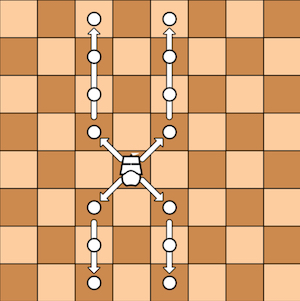
-
Gazelle: jumps 2 or 3 step orthogonally or diagonally. No matter what intermediate cases contain. This piece promoted to a Sorceress (Star) when reaching the last row.

-
Squirrel: also a compound piece that jumps as a Knight or jumps at 2 squares, diagonally (a move called Alfil) or orthogonally (a move called Dabbaba). It promotes to a Lion when it reaches the last row.

Pieces Value
Zillions gives these average values, normalized to 5 for the Rook :
Pawn: 0.5, Giraffe: 1.7, Camel: 1.8, Elephant: 2, Knight: 2, Machine: 2.2, Prince: 2.3, Troll: 2.4, Crocodile: 3.3, Bishop: 3.4, Centaur: 4.1, Missionary: 4.4, Cannon: 5, Rook: 5, Cardinal: 5.3, Buffalo: 5.4, Duchess: 5.8, Lion: 6, Admiral: 6, Rhinoceros: 6.1, Marshall: 6.9, Sorceress: 8.2, Queen: 8.3, Eagle: 8.4, Amazon: 10.2
(Squirrel would be 3.9)
These values are just given for a very rough estimate. A lot of players would disagree and give less or more points to several piece. Never mind, make your own scale.
Incredible!
Terachess (-I) has been manufactured by Khoa Pham in Vietnam. Few details have changed and the game renamed Fairy Chess, but it is the same. The pieces are wonderful.
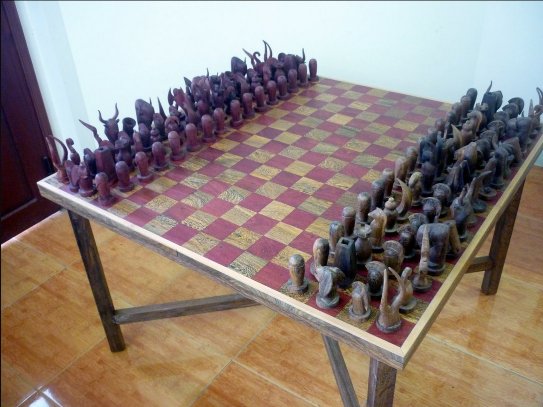
Find Terachess in the Chess Variant Pages
There is a preset to play it there.











